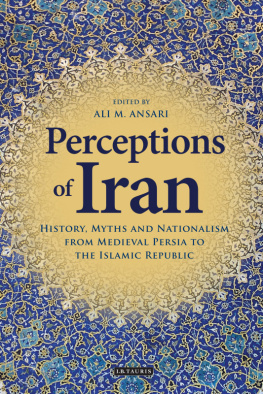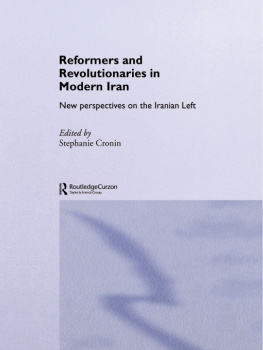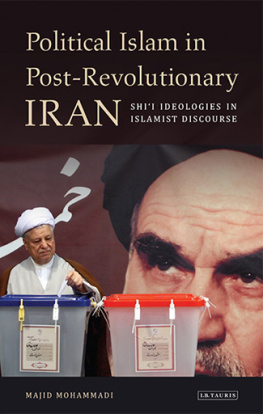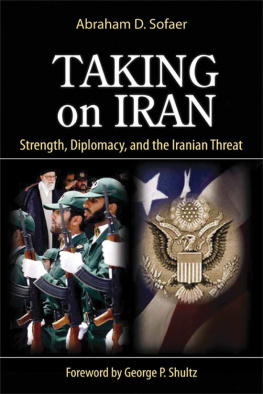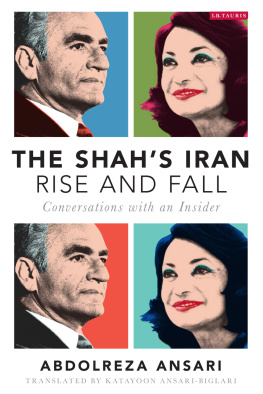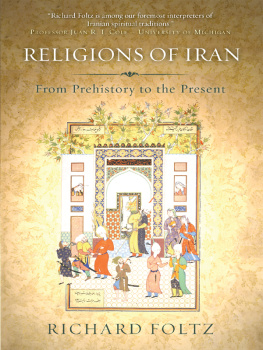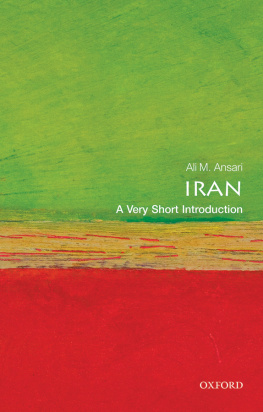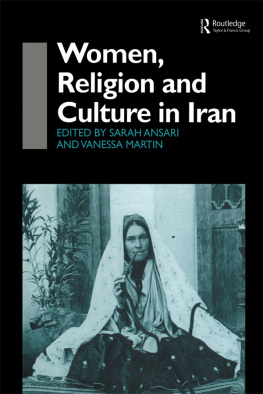Iran, Islam and Democracy
The Politics of Managing Change
Ali M. Ansari
This revised and expanded third edition first published in 2019 by Gingko Library, 4 Molasses Row, London, under licence from Chatham House, the Royal Institute of International Affairs, London.
Sections of this book first published in Great Britain in 2000, 2009 and 2010 by Chatham House, the Royal Institute of International Affairs. Parts I, III, and IV copyright Chatham House.
Part II of the current volume has been reproduced from Ali Ansari. Iran under Ahmadinejad: Populism and its Malcontents. International Affairs (2008) 84 (4): 683700. By permission of Oxford University Press on behalf of The Royal Institute of International Affairs. Part II copyright Oxford University Press.
Link: https://doi.org/10.1111/j.1468-2346.2008.00732.x
Parts V, VI, and VII copyright Ali M. Ansari, 2019.
The right of Ali M. Ansari to be identified as the author of this work has been asserted in accordance with the Copyright, Designs and Patent Act 1988.
All rights reserved. Except for brief quotation in a review, no part of this book may be reproduced in any form or by any electronic or mechanical means, including information storage and retrieval systems, without written permission from the publisher.
A CIP catalogue record for the book is available from the British Library.
ISBN 978-1-909942-98-1
eISBN 978-1-909942-95-0
Typeset in Times by MacGuru Ltd
Printed in Spain
www.gingko.org.uk
@gingkolibrary
Contents
Historians who write in aristocratic ages are inclined to refer all occurrences to the particular will and character of certain individuals; and they are apt to attribute the most important revolutions to slight accidents. They trace out the smallest causes with sagacity, and frequently leave the greatest unperceived.
Historians who live in democratic ages exhibit precisely the opposite characteristics. Most of them attribute hardly any influence to the individual over the destiny of the race, or to citizens over the fate of a people; but, on the other hand, they assign great general causes to all petty incidents.
Alexis de Tocqueville, Democracy in America Part II, Chapter XX (1835)
If this presumed group of patriarchs, despite the overwhelming material forces which it possesses, does not have the consent of the majority, it will have to be judged either inept or not representative of the national interests which are bound to be predominant in inducing the national will in one way rather than in another. Unfortunately everyone is led to confuse his own particular interests with those of the nation and therefore to find it horrible, etc., that it is for the law of numbers to decide; surely it is better to become an elite by decree. The question therefore is not one of people who are intellectually well off? and feel themselves reduced to the level of the last illiterate, but of those who presume that they are well off and want to take away from the ordinary man even that small fraction of power which he possesses in deciding the course of State life.
Antonio Gramsci, The Modern Prince (1949)
Acknowledgements to the Third Edition
Few authors are fortunate enough to be able to publish a third edition of a text still less one that draws together and collates in a single volume, various writings produced over nearly two decades of reflection on the politics of the Islamic Republic of Iran. I am especially grateful to Barbara Schwepcke for having taken on this particular challenge with her characteristic enthusiasm and joie de vivre. If only all publishers were as fun to work with! Iran, Islam and Democracy, which remains the heart and soul of the offering in this collated volume was initially published at the tail end of 2000, with a second edition taking the narrative up to the end of Khatamis presidency, published in 2006. It was my first monograph, distinct from my thesis, but very much a (by-)product of the several years of fieldwork in Iran over the previous decade.
That it ever saw the light of day was down to the support and enthusiasm of Rosemary Hollis, who was then director of the Middle East and North Africa Programme at Chatham House. As an untested post-doc, it was she who encouraged me to put my ideas on paper, not only the narrative of the reform movement but, crucially, the ideas that for me shaped the nature of the Iranian state. Indeed, many of the pieces included in this volume were written while I was an Associate Fellow at Chatham House, and I am very grateful to the Institute for having been so helpful in the production of this volume. Two colleagues from those early days, Dr (now Professor) Toby Dodge, and Robert Lowe, who have since moved onto the LSE (whose Middle East Centre initially published my piece on Rouhanis election), were pivotal in helping me shape my ideas and, in Roberts case, in getting the second edition, as well as the study of the 2009 election crisis, into print.
I would also like to thank two of my finest graduate students, Tom Rintoul and Daniel Berman for their meticulous interrogation of the election data in the Preliminary Analysis of the 2009 election, included in this collection.
There are in truth far too many people to thank for their help, direction and intellectual guidance over the years (the acknowledgements to the previous editions are indicative of this), but special mention must be made of my supervisor Professor Charles Tripp, who not only got me started but kept me focussed, as well as numerous colleagues in the institutions I have been fortunate enough to teach in, and beyond. The University of St Andrews, my academic home since 2004, has proved a particularly fruitful and stimulating intellectual environment. Last but by no means least, I owe a debt of gratitude to my wife Marjon, who has often been the first and last port of call for ideas at various stages of gestation, and whose reaction has had a significant impact on their longevity! This volume is dedicated to her.
Ali M. Ansari
St Andrews, 2018
Preface to the Third Edition
The first edition of this book was published in late 2000. It was the product of extensive fieldwork conducted in the 1990s during the waning years of the presidency of Ali Akbar Hashemi Rafsanjani the self-styled general of reconstruction and the emergence of the reformist Mohammad Khatami, who came into office in a dramatic landslide election victory in 1997. It sought to provide an explanatory framework for the rise of reformism in Iran and an assessment of its potential for success in transforming Iran from a revolutionary state into a functioning Islamic Republic founded on a cogent theory of Islamic democracy. It sat within and reflected a popular genre of research at the time which sought to outline paths to democracy in what was understood, following Huntington, as the third wave of democratisation, even if the term itself, for reasons of local sensibilities, was replaced in common discourse with the development of civil society. The first edition was characteristically upbeat some might say whiggish in its outlook, and certainly argumentative in its suggestion that a democratic settlement in Iran was not only possible but highly probable.


